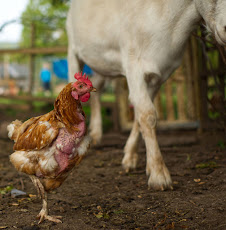Hen care: the basics
We've learnt a lot since our first chicken rescue back in 2018. Rescue hens are disoriented, anxious, and often a little poorly when they are first freed. With plenty of love and care, they make really rewarding companions.
Here's our basic guide to the essentials of feeding, housing, and nurturing hens:
- Food and water
o Pellets are a complete food source
o Treat foods include corn, green leafy veg, grass clods and fruit (no citrus)
o Grit helps hens digest food easily
o Garlic is good for them so try mixing it in with their food
o Use a sealed, air-tight container to keep their food fresh and dry
o Give them fresh water every day to avoid dehydration (hens won't drink dirty water)
o Optional: add a dash of apple cider vinegar to their water
o Optional: buy some handy food and water dispensers
- Secure house and run
o They'll need a purpose made coop (hen house) with ramps, nest (roost) boxes and wire run
o Use hardwood chips or a similar material for the coop floor
o Optional: electric fencing or stone walls protect from predators
- Bedding
o Dust-extracted wood shavings or cut and dried hemp are best
o Straw or shredded paper are cheaper but need changing more often
o Use a shovel, stiff brush or scraper along with a bucket for cleaning
o Optional: anti-parasite cleaning fluids
- Cleaning
o Put time aside once a week (or every fortnight at a push) to clean out the coop
o Be prepared to spend 5-10 minutes every day looking after your hens – doing quick spot cleans to scrape away fresh poo, provide fresh water, and top up the bedding and feed
- Healthcare
o Get your hens vet-checked and vaccinated as soon as possible
o Worm them regularly – a simple treatment but consult your vet for guidance
o Look out for signs of common illness such as prolapse (see our guide for further info)
- Noise
o There’s no need to be concerned about the noise that your new pets may make. Hens make a lot of sounds, but most are soft, gentle clucking noises
o The only time they get louder is to proudly announce that they have laid an egg
o They will also scream if they are being attacked.
If you hear this in the night, please check on them
- Enrichment
o Dust baths
o Cuddles! Once they trust you, a chicken will let you stroke and pet them
o Eggs: chickens enjoy eating their own eggs to top up on important nutrients (calcium, protein and vitamins)
o Hens love toys so try hanging some CDs on strings - they enjoy pecking anything shiny
Coming soon: our hen care starter kits! These have a detailed guide on how to care for them, starter feed and bedding, and homemade treats and toys.
Some of our chicken rescues and Bea in her wheelchair
Bea’s Story
Lying underneath thousands of terrified chickens being saved from a ‘free range’ farm in Derby, Bea was not moving. She looked like she’d completely given up.
Katherine recalls: “She just kept closing her eyes like she didn’t want to be there, and one leg was totally limp. It didn’t look good…”
To read the full story, shop for Bea’s activity sheet
To support our beautiful family of rescues, head over to our website or paypal to donate!




Comments
Post a Comment